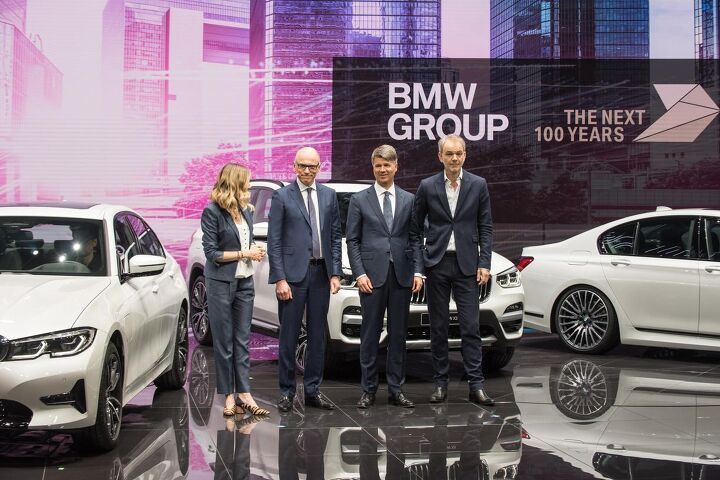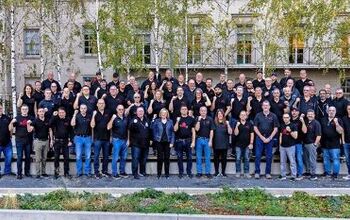The 2019 Geneva Motor Show Is Basically a Middle School Dance

As we get older, whole sections of our lives are mentally distilled into a handful of standout moments, accompanied by the broad strokes of shared experiences. Among them is the middle school dance, which really isn’t so much a dance as it is an opportunity for people to stand around wishing everyone would couple up and get the party started. Everyone’s hunting for a partner, but few will see that dream realized, leaving them to stand by their closest friends while they mumble “it sure would be nice to find someone to dance with” into their fifth cup of punch.
The Geneva Motor Show looked a lot like that this year. With car sales cooling, emission controls tightening, and ambitious mobility projects eating into automakers’ profit margins, many companies believe the industry is evolving. However, no one’s certain what the future holds, so they’re dabbling in everything. That’s not a sound business strategy, especially if there’s no one around to help you share the financial burden.
As a result, auto executives spent quite a bit of time in Geneva hinting that they could use a dance partner.
Bloomberg chronicled standout moments where high-ranking executives indicated they were open to corporate alliances, but only after it explained the industry’s current situation:
Profit warnings, missed targets and falling stock prices at parts suppliers like Schaeffler AG and ElringKlinger AG — mainstays of the industry — show the depth of the rumbling underfoot. Paired with the news that luxury segment archrivals BMW AG and Daimler AG are teaming up on autonomous driving, and Volkswagen AG is allowing a startup to share the electric-car technology it wants to make a global standard, the industry’s new contours are taking shape.
“We are entering a period where chaos is going to make competition extremely selective,” PSA Group Chief Executive Officer Carlos Tavares said in Geneva. “This perhaps changes the way our companies are operating and it could also raise opportunities for deals eventually.”
Despite (or perhaps because of) the event being awash with high-end luxury vehicles, trendy electrics, and premium performance cars for the extremely wealthy, automakers spent quite a bit of time talking about ways to cut costs and find help. PSA, which wants to get Peugeot back into North America, is keeping an eye on how to best make that happen. Fiat Chrysler Automobiles could be its point of entry. A merger could allow Peugeot to tap into FCA’s established dealer network and bring them up to speed on how the American market treats returning European brands.
“If there’s an opportunity for partnership, for an alliance, for a merger that could make us stronger, I will clearly look into it,” FCA CEO Mike Manley told reporters.
Tavares was not opposed to the idea, saying that he’s open to deals in general by saying, “this one or another one.” In addition to Fiat Chrysler, PSA is also said to be in talks with advisers from General Motors and Jaguar Land Rover.
Volkswagen already intends to share its new electric vehicle platform (MEB) with a battery-car startup based in Aachen, Germany, and has made serious inroads with Ford for the assembly of vans and pickups. The duo are currently exploring how to cooperate on autonomous driving in exchange for Ford’s access to VW’s battery technology.
Meanwhile, Nissan and Renault have had to contend with a scandal that saw its former patriarch, Carlos Ghosn, arrested in Japan over allegations of financial impropriety. While the accused has repeatedly indicated that his plight is the direct result of Nissan hoping to avoid a full merger, the company says it plans to continue collaborating as before.
However, the strangest prospective alliance has to be between BMW and Daimler — or it would have been, if the pair hadn’t already agreed to spend 1 billion euros on mobility projects (autonomous development, ride-hailing services, car sharing, etc). Their longstanding rivalry appears to be dissolving, as the two companies are now in discussions to further strengthen ties via joint vehicle development.
“Partnering is essential to survive the industry transformation,” BMW development head Klaus Fröhlich told reporters during a joint press event with Daimler AG’s Ola Källenius.
The brave new world the industry finds itself hurtling towards won’t just affect automakers, either. Parts suppliers face similar issues. Restructuring is taking place across the industry as profits slip and share prices ooze down the board. Parts companies can see the writing on the wall and know something must be done.
“Not everybody can afford to keep spending all this money, especially with how fast this innovation is coming,” Don Walker, CEO of Austrian-Canadian supplier Magna International explained. “There will be more cooperation, whether it’s through joint ventures or acquisitions.”
[Images: Geneva International Motor Show]

A staunch consumer advocate tracking industry trends and regulation. Before joining TTAC, Matt spent a decade working for marketing and research firms based in NYC. Clients included several of the world’s largest automakers, global tire brands, and aftermarket part suppliers. Dissatisfied with the corporate world and resentful of having to wear suits everyday, he pivoted to writing about cars. Since then, that man has become an ardent supporter of the right-to-repair movement, been interviewed on the auto industry by national radio broadcasts, driven more rental cars than anyone ever should, participated in amateur rallying events, and received the requisite minimum training as sanctioned by the SCCA. Handy with a wrench, Matt grew up surrounded by Detroit auto workers and managed to get a pizza delivery job before he was legally eligible. He later found himself driving box trucks through Manhattan, guaranteeing future sympathy for actual truckers. He continues to conduct research pertaining to the automotive sector as an independent contractor and has since moved back to his native Michigan, closer to where the cars are born. A contrarian, Matt claims to prefer understeer — stating that front and all-wheel drive vehicles cater best to his driving style.
More by Matt Posky
Latest Car Reviews
Read moreLatest Product Reviews
Read moreRecent Comments
- Kwik_Shift_Pro4X I will drive my Frontier into the ground, but for a daily, I'd go with a perfectly fine Versa SR or Mazda3.
- Zerofoo The green arguments for EVs here are interesting...lithium, cobalt and nickel mines are some of the most polluting things on this planet - even more so when they are operated in 3rd world countries.
- JMII Let me know when this a real vehicle, with 3 pedals... and comes in yellow like my '89 Prelude Si. Given Honda's track record over the last two decades I am not getting my hopes up.
- JMII I did them on my C7 because somehow GM managed to build LED markers that fail after only 6 years. These are brighter then OEM despite the smoke tint look.I got them here: https://www.corvettepartsandaccessories.com/products/c7-corvette-oracle-concept-sidemarker-set?variant=1401801736202
- 28-Cars-Later Why RHO? Were Gamma and Epsilon already taken?





































Comments
Join the conversation
Why French auto CEOs all have Spanish name "Carlos"? On the serious note - what PSA is doing at Geneva auto show? They don't make any premium brands. I actually thought that it is much simpler to design and make EV because of their simplicity and much smaller number of moving parts. I saw future of EV as automakers making chassis and coach-builders - the customized body or one from catalog of various styles from leading stylists (mostly Italians).
Innovation is an overused and abused word these days.